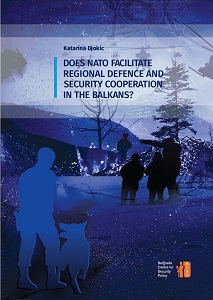DOES NATO FACILITATE REGIONAL DEFENCE AND SECURITY COOPERATION
IN THE BALKANS?
DOES NATO FACILITATE REGIONAL DEFENCE AND SECURITY COOPERATION
IN THE BALKANS?
Author(s): Katarina Đokić
Subject(s): Politics / Political Sciences, Politics, Security and defense
Published by: BCBP Beogradski centar za bezbednosnu politiku
Summary/Abstract: Despite the low-intensity conflict that is currently prevailing in the Western Balkans, shared political interests and common security threats will push the countries in the region towards enhanced cooperation in the long term. Considering NATO's strong presence in the region – not least because most countries are either its members or interested in membership – it is worth while assessing its contribution to stability through fostering regional cooperation. Hence, this paper examines to which extent NATO has acted as an ʻinterfaceʼ for regional defence and security cooperation and looks at the challenges and opportunities for the Alliance to play such role. This question is not only relevant from the ʻlocalʼ perspective, but also from NATO's one, especially since the current partnership policy emphasises regional cooperation as a way to boost cooperative security. Moreover, cooperative security is cheaper than crisis management and this notion should be vital in NATO's approach to the Western Balkans in the forthcoming years. The analysis shows that NATO indeed offers mechanisms for strengthening cooperation, but their use has been significantly hampered by the fact that neither the countries in the region recognise them, nor is NATO willing to promote them as such. The paper identifies five major challenges to NATO's role as an ʻinterfaceʼ of regional cooperation. However, there are also arguments in favour of such role and opportunities to expand it. Firstly, there is a widespread notion that NATO's partnership tools are designed for bilateral cooperation between the individual country and NATO. To be fair, this is mostly true, but practice has shown that at least several tools could contribute to networking the region. In fact, NATO not only brings the countries together at courses and exercises, but also helps them establish shared interests, develop unique standards and create interpersonal contacts. Secondly, NATO's approach towards the region is rather fragmented. Even though NATO's political documents acknowledge the necessity of promoting regional security, this organisation is in practice prevailingly oriented towards working directly with individual countries. This may prevent broader situational awareness and understanding of what exactly shapes local policies and societies. At the same time, NATO has sufficient capacities to more comprehensively monitor the situation in the field and develop more coherent policies. Thirdly, the track record in synergies between NATO/Partnership for Peace programmes and regional initiatives or bilateral cooperation activities has been quite modest so far. Nonetheless, some regional initiatives have found ways to benefit from NATO tools and mechanisms, especially when it comes to adopting NATO standards and developing interoperability. Fourthly, countries in the region have not duly switched from donor recipients to equal allies or partners to NATO, who would be ready to propose and co-fund their own capability development projects. Regional cooperation will increasingly have to be initiated bottom-up rather than appear as a reaction to donors' incentives, as was the casein the previous decade. Nonetheless, the countries do recognise shared security policy interests. This particularly refers to strengthening civil disaster response. Fifthly, when talking about NATO's role in the Western Balkans, the problem of its legitimacy in some countries cannot be disregarded. This is an important point for decision-makers in NATO dealing with the region to understand, but no justification for national leaders to succumb to populism. Instead, an open and honest debate about future political priorities is needed.
Series: Beogradski Centar za Bezbednosnu Politiku - POLICY PAPERS
- Page Count: 34
- Publication Year: 2019
- Language: English
- Content File-PDF

